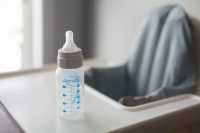
22 Oct Avoiding Cow’s Milk Formula at Birth May Reduce Food Allergies
MedicalResearch.com Interview with:
Mitsuyoshi Urashima MD, PhD, MPH
Professor of Molecular Epidemiology
Jikei University School of Medicine
Tokyo, JAPAN
MedicalResearch.com: What is the background for this study?
Response: IgE-mediated food allergy is becoming a global concern, because its prevalence and severity are worsening. Many Japanese maternity wards encourage breastfeeding, but allow mothers or nurses to supplement breastfeeding with cow’s milk formula, e.g., approximately 6 to 10 hours after birth or even earlier, based on maternal preferences, but not based on clinical evidence. However, more than 20 to 30 years ago, sugar water was given instead of cow’s milk formula supplement at birth. Thus, we hypothesized that early exposure to cow’s milk formula at birth is, at least in part, associated with the recent increase in children with food allergy.
Therefore, a randomized clinical trial, named ABC (Atopy induced by Breast feeding or Cow’s milk formula), was conducted to assess whether the risk of cow’s milk formula sensitization and food allergy is decreased by either avoiding or supplementing cow’s milk formula at birth. Immediately after birth, newborns were randomly assigned (1:1 ratio) to either breastfeeding with or without amino acid-based elemental formula for at least the first 3 days of life (breastfeeding ± elemental formula), or breastfeeding supplemented with cow’s milk formula (≥5 mL/day) from the first day of life to 5 months of age (breastfeeding + cow’s milk formula).
MedicalResearch.com: What are the main findings?
Response: In this randomized clinical trial involving 312 participants, risks of sensitization to cow’s milk and immediate-type food allergy, including cow’s milk allergy and anaphylaxis, were decreased by avoiding cow’s milk formula supplementation for at least the first three days of life, as follows;
- The primary outcome:atopic sensitization to cow’s milk protein, i.e., serum levels of cow’s milk-specific IgE (CM-IgE) ≥0·35 UA/ml at 24 months of age, occurred in 24 (17%) breastfeeding ± elemental formula infants, which was significantly fewer than 46 (32%) cow’s milk formula infants.
- The prevalence of immediate and anaphylactic type of food allergy at the second birthday was one fifth in breastfeeding ± elemental formula than in breastfeeding + cow’s milk formula infants: 4 (2.6%) vs 20 (13%).
- The incidence of anaphylactic type of food allergy by the second birthday was less than one tenth in breastfeeding ± elemental formula than in breastfeeding + cow’s milk formula infants: 1 (0.7%) vs 13 (8.6%).
MedicalResearch.com: What should readers take away from your report?
Response: Both sensitization to cow’s milk and clinical food allergies are preventable by avoiding cow’s milk formula supplementation at birth, which is easily and immediately applicable to clinical practice worldwide without the cost and time of therapy.
MedicalResearch.com: What recommendations do you have for future research as a result of this work?
Response: We have started a next clinical trial titled “Primary prevention of food allergy by restricting maternal intake of processed meat and others during first month after birth” as ABC II (UMIN000035585).
MedicalResearch.com: Is there anything else you would like to add?
Response: We cannot differentiate which intervention was effective in preventing food allergy development, avoiding cow’s milk formula or exposing to elemental formula for the first 3 days. However, cow’s milk formula and elemental formula are fundamentally same except whether including cow’s milk protein or amino acids without cow’s milk protein. Randomization into three groups; 1) elemental formula + cow’s milk formula from the 1st day of birthday, 2) breastfeeding alone for the first 3 days avoiding both cow’s milk formula and elemental formula, and 3) breastfeeding + elemental formula for the first 3 days avoiding cow’s milk formula, is ideal. However, if mothers do not have enough breast milk, it is ethically hard to keep intervention of breastfeeding alone even for 72 hours at birth.
No disclosures
Citation:
JOIN OUR EMAIL LIST
[mailpoet_form id="5"]We respect your privacy and will never share your details.
Last Modified : [last-modified]
The information on MedicalResearch.com is provided for educational purposes only, and is in no way intended to diagnose, cure, or treat any medical or other condition. Always seek the advice of your physician or other qualified health and ask your doctor any questions you may have regarding a medical condition. In addition to all other limitations and disclaimers in this agreement, service provider and its third party providers disclaim any liability or loss in connection with the content provided on this website.
Last Updated on October 22, 2019 by Marie Benz MD FAAD
